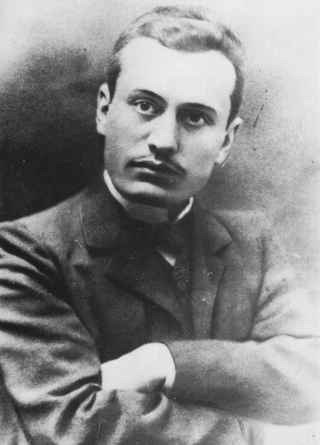Week 25
Mussolini was born in a small town in the Romagna near Forli. (The Romagna is a provincial name that echoes Rome, but is a distinct area of northern Italy stretching southeast and northwest from Bologna.)
His father, Alessandro Mussolini was an extreme radical thinker in a very small town, who hated the church as much as he loved Garibaldi. Papa Mussolini brought up his son in a household of hot political debate. All day, all the time, they discussed and acted upon radical political motivations.
The Mussolini family celebrated the "people," the "popolo." Alessandro Mussolini preached about the people and the rich nasty aristocrats who lived off of the poor and the downtrodden. So young Benito grew up in the middle of constant political debate. And he grew to be very good at it. His various breakthroughs into power were all driven by his unique rhetorical power that was with him from the very beginning.
REQUIRED READING FOR SPRING QUARTER

Christopher Duggan,
A Concise History of Italy,
Cambridge University Press; 2 edition (January 20, 2014),
ISBN 0521747430
RECOMMENDED READING
Our discussion of Mussolini may move you to want to know more about him. The best biography is this one by Christopher Hibbert.

Christopher Hibbert,
Mussolini: The Rise and Fall of Il Duce,
St. Martin's Griffin (July 22, 2008),
ISBN 0230606059
From Amazon:
“Christopher Hibbert is a wonderful narrative historian who has illuminated many corners of Italian life and history. He has the gift of creating scenes and characters, of rendering the vividness of the past. His Mussolini is no exception. He manages to convey both the charisma and dilettantismo of Mussolini the revolutionary leader as well as the later folly of Il Duce, the dictator who began increasingly to believe his own rhetoric -- ''Mussolini is always right' -- in leading his country into World War and ruin.” ―Alexander Stille, award-winning author of Benevolence and Betrayal: Five Italian-Jewish Families Under Fascism, and of The Sack of Rome: Media + Money + Celebrity = Power = Silvio Berlusconi
Reviews:
“Hibbert is a remarkably prolific popular historian, who can take on almost anything, from Dickens to General Wolfe, from Agincourt to Garibaldi.” ―The Observer
“An excellent account...balanced and perceptive in outlook...well-written and entertaining.” ―Economist
“[Hibbert] is a superbly skillful historical writer.” ―The Spectator
“An adroitly written evocation of a compelling but enigmatic personality, a man whose ambition, idealism and opportunism would not seem out of place on the political scene today.” ―Publishers Weekly on Disraeli
“Hibbert's lively and engaging portrait of Benjamin Disraeli joins the author's numerous other well-received, popular biographies...A supremely readable and enjoyable study of a colorful, often astonishing and modern character.” ―Library Journal on Disraeli

R.J.B. Bosworth,
Mussolini's Italy: Life Under the Fascist Dictatorship, 1915-1945,
Penguin Press HC, The; 1st American Edition edition (February 2, 2006),
ISBN 1594200785
HIGHLY RECOMMENDED READING
The single best book in the English language to explain the power of Hitler and Mussolini with the crowds of followers and the power of their words is Eric Hoffer's brilliant The True Believer. The book is now more than fifty years old, and yet it is more relevant and more obviously true than when it was published in the 1950's. The secret of the dictators was that they knew how to touch the hearts of their trouble peoples and to engender in those hearts the willingness to sacrifice one's self to the larger cause. Hoffer explains what this was all about. The book is a masterpiece and is still read in universitie classes studying the mind and movements of the masses in the Twentieth Century. If you have never read it, this is the perfect time to do it.

